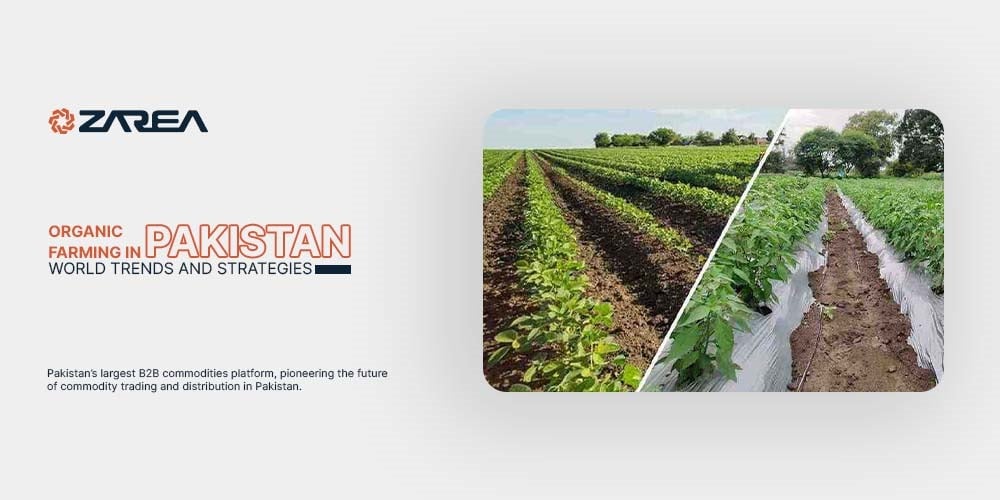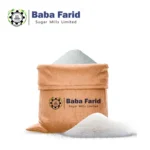Introduction – Organic Farming:
Organic agriculture, also referred to as organic farming or biological farming. A farming system that prioritizes naturally derived, non-synthetic materials like composted manure, green manure, and bone meal, and focuses on methods such as crop rotation, companion planting, and mixed cropping. Biological pest management techniques, like promoting insect predators, are also recommended.
With the shift towards sustainable agriculture, organic farming has attracted considerable attention owing to its ecological advantages and rising consumer interest in chemical-free foods. Pakistan, possessing significant agricultural potential, is also investigating organic farming to conform to global trends and encourage healthier, environmentally friendly agricultural methods.
Zarea offers a comprehensive examination of organic farming in Pakistan. As worldwide trends, and successful approaches to encourage sustainable agriculture.
Organic farming in Pakistan:
Its aim is to create low-cost, less labor-intensive, high-yielding, superior quality, and healthy organic farming. Minimizing production costs to attain self-sufficiency in all resources. It is acknowledged as a lasting remedy for the issue arising from nitrate contamination. Organic farming initially exhibits lower yields compared to conventional farming; however, due to its lower input costs and the affordability of labor in Pakistan, over time, as organic practices enhance soil quality, promote soil organisms, and increase earthworm activity along with substantial vermicast production, the yields will eventually exceed those of conventional farming methods.
Methods of Organic Farming:
Organic farming techniques merge scientific understanding of ecology and certain modern technologies with traditional agricultural methods rooted in naturally occurring biological processes. Agroecology examines methods of organic farming. Conventional agriculture employs synthetic pesticides and water-soluble, chemically refined fertilizers, whereas organic farmers are limited by regulations to utilizing natural pesticides and fertilizers.
Although organic farming is fundamentally distinct from conventional farming due to its reliance on carbon-based fertilizers instead of highly soluble synthetic fertilizers and its use of biological pest control in place of synthetic pesticides, organic farming and large-scale conventional farming are not completely incompatible. Numerous techniques created for organic farming have been adopted by traditional agriculture.
Organic farming is a production method that maintains the wellness of soils, ecosystems, and individuals. It depends on ecological processes, biodiversity, and cycles suited to local conditions instead of inputs that have negative impacts. Organic farming blends tradition, innovation, and science to enhance the common environment and foster equitable relationships and a high quality of life for everyone involved.
(International Federation of Organic Agriculture Movements)
Understanding Organic Farming:
The anticipated growth rate for organic farming globally is 20-30%, yet organic agriculture will always fall short of feeding the swiftly increasing world population because of low labor productivity despite high yields. Excessive use of chemicals depletes the land of organic matter, resulting in a decline in average production per hectare. Excess food production lowers commodity prices, benefiting farmers, yet those in need struggle to purchase expensive organic options.
Organic farming is an agricultural approach that steers clear of synthetic chemicals, such as pesticides, fertilizers, and genetically modified organisms (GMOs). Instead, it emphasizes:
- Organic fertilizers (compost, dung)
- Biological pest management (helpful insects, crop diversification)
- Sustainable soil stewardship (cover cropping, organic matter enhancement)
This method improves soil fertility, biodiversity, and ecological sustainability while yielding healthier, chemical-free produce.
Global Trends in Organic Farming:
Organic products occupy a premium market, making them inaccessible to the entire population because of price limitations. The cost of organic goods rises due to factors like limited production, dispersed farms, distinct packing facilities, pricier recycled packaging, and store pricing strategies.
The market has 300 organic trademarks available. The organic label exists in 15 different countries. Organic trade should empower local communities for improved social and environmental responsibility, food security, conservation of natural resources, and the maintenance of biological and cultural diversity.
Organic farming is undergoing swift global expansion, fueled by consumer interest in organic products and government initiatives that promote sustainable farming practices. Several important worldwide trends consist of:
Increase in Organic Farmland
- More than 75 million hectares of land globally are managed through organic farming.
- Nations such as India, China, and the United States are at the forefront of organic farming.
Rising Consumer Demand
- The worldwide organic food market is expected to exceed $400 billion by the year 2030.
- Health-minded shoppers choose organic items for their nutritional advantages and absence of chemicals.
Government Support and Certifications
- Numerous nations offer subsidies, tax advantages, and certifications for organic agriculture.
- Organic certification schemes (EU Organic, USDA Organic) guarantee adherence to global trade standards.
Technological Integration in Organic Farming
- The implementation of AI, drones, and IoT-driven monitoring systems is transforming organic agriculture.
- Blockchain technology improves clarity in supply chains for organic products.
The Constraints of Organic Farming in Pakistan:
The agriculture sector in Pakistan accounts for approximately 19% of the GDP and provides jobs for 38% of the labor force. Nonetheless, organic farming is still not well-developed because of insufficient awareness and the absence of government incentives.
Challenges for Organic Farming in Pakistan
- Restricted availability of organic certification
- High production expenses in relation to traditional agriculture
- Insufficient governmental support and regulations
- Lack of awareness among farmers and consumers
- Improving farm management requires poverty reduction, sustainable development, food security, agrarian reforms, and suitable technologies.
In spite of these obstacles, organic farming in Pakistan is on the rise, supported by organic food shops, farmers’ markets, and private sector efforts advocating for chemical-free farming.
Strategies to Promote Organic Farming in Pakistan:
Organic farming and organic markets might face issues because of insufficient management skills. Additionally, individual interest might outweigh collective interest, with market expansion into traditional, fair trade, and organic sectors. Obtaining organic certification is a time-consuming, difficult, and expensive endeavor, posing a challenge for small-scale producers. The price premium over the market rate is inadequate, and the rigidities in the fair trade system diminish a significant portion of the price premium. The fair trade movement can effectively confront social dumping, which refers to the exploitation of inexpensive labor and child labor.
To align with international trends and enhance organic farming in Pakistan, the subsequent strategies need to be implemented:
Government Policies and Subsidies
- Implement tax advantages, grants, and monetary incentives for organic farmers.
- Create organic research facilities to promote advancements in agricultural practices.
Organic Certification Programs
- Establish a national certification system for organic goods.
- Work together with global certification organizations to enable organic exports.
Farmer Training and Awareness Campaigns
- Implement programs to educate about organic farming techniques.
- Educate farmers on bio-fertilizers, composting techniques, and eco-friendly pest management.
Market Development and Organic Supply Chains
- Broaden organic marketplaces and online platforms for direct sales from farmers to consumers.
- Enhance organic food labeling to foster consumer confidence.
Integration of Smart Agriculture Technologies
- Utilize precision agriculture technologies like drones and IoT sensors to improve organic crop yield.
- Utilize blockchain technology for clear tracking of organic food.
The Future of Organic Farming in Pakistan:
As awareness grows, organic farming in Pakistan can flourish. Important upcoming advancements comprise:
- Development of organic cooperatives to assist small-scale farmers
- Growth of export markets for organic products from Pakistan
- Increased use of sustainable farming methods to address climate change
- Create training and promotion initiatives to enhance export potential for organic products
- In the future, the Government should create improved Trade regulations that are socially equitable, environmentally sustainable, and promote higher standards for fair and green trade.
Final Thoughts:
Organic farming signifies a sustainable future for agriculture in Pakistan. By aligning with worldwide trends and executing efficient strategies, Pakistan can improve food security, safeguard the environment, and stimulate economic growth.
Putting money into organic farming now will result in a healthier, wealthier future!
FAQ’s:
Why is organic farming important in Pakistan?
Organic farming appears to be a feasible answer to address the issues of land degradation, biodiversity decline, and climate change while fostering inclusive and fair development, leading to a resilient and environmentally sustainable future for Pakistan’s agriculture sector.
What is an organic farming system?
Organic agriculture is characterized as “a comprehensive farming approach that aims for sustainability, improves soil fertility and biological diversity while, with few exceptions, banning synthetic pesticides, antibiotics, synthetic fertilizers, genetically modified organisms, and growth hormones”.
Which farming is best in Pakistan?
The key crops are wheat, sugarcane, cotton, and rice, which collectively represent over 75% of the total crop output value. Wheat is the biggest food crop in Pakistan.
What is an example of organic farming?
Certain organic farming methods involve crop rotation, green manures and composting, biological pest management, and mechanical tillage. Certain of these methods are also applied in traditional farming. Crop rotation involves changing the types of crops that are cultivated in a field or planting area over different seasons.
What are the basic principles of organic farming?
The four tenets of organic farming — health, fairness, ecology, and care — offer a perspective for agriculture that motivates sustainable cultivation and production practices.

































